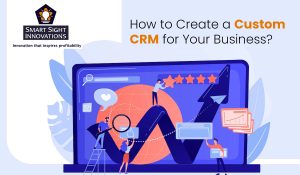 Synopsis: Customer relationship management (CRM) allows every business to organize, automate and synchronize customer interactions. It includes marketing, sales, customer service and support. As a business grows, there is a need for scalable solutions with a CRM system and a customized solution works even better.
Synopsis: Customer relationship management (CRM) allows every business to organize, automate and synchronize customer interactions. It includes marketing, sales, customer service and support. As a business grows, there is a need for scalable solutions with a CRM system and a customized solution works even better.
You can design your CRM with security in mind by using various mechanisms. Plus, custom CRM software is more flexible and scalable than ready-to-use solutions.
You can build your custom CRM. It meets your specific needs and can be stable, secure, flexible and scalable. Additionally, you can harmonize information across departments for better collaboration. Building a custom CRM system from scratch can change the way you manage your customer relationships from start to finish. Knowing about the steps can help.
Before you begin, know about the following three aspects:
-
CRM development goals
You must define your business goals and prioritize them to build a CRM platform. It will help you decide on your CRM system design and features best suited for your business. Your goals in developing a CRM can vary depending on your business and industry, and may include:
- Optimization of marketing and sales processes
- Improving internal communication
- Finding valuable and detailed insight into customer behavior
- Storing and managing customer data in one place
- Meeting customer satisfaction and loyalty
- Managing leads
- Customer base management
- Customer service optimization
- Prepare reports to evaluate sales and marketing performance
- Maximizing ROI
-
Types of CRM systems
Once you have determined your goals for CRM software development, decide what type of solution you need. You have to choose from three types of solutions – operational, analytical and collaborative. Each is designed for a different purpose.
Operational
It is designed to automate the marketing, sales and service processes. With an operational CRM, you can seal more deals, effectively generate leads and convert them into loyal customers. You also get access to customer data such as contact details, sales and communication history.
Analytical
This system helps businesses effectively manage customer data and customer acquisition and retention processes. An analytical system gives insight into customer data from different channels so you can see the common issues your customers are facing and gauge the effectiveness of your marketing and sales strategies.
Collaborative
A collaborative system is a strategic one that focuses on improving teamwork, developing better customer service, and increasing customer satisfaction and retention. With a collaborative system, communication with customers is synchronized across various communication channels such as email, phone and social networking platforms.
-
CRM features
Working with clients can be challenging. Keeping up with contacts, diagnosing problems accurately and ensuring satisfaction and positive interactions helps. CRM software can handle the workload for business and sales processes. Your strategy can see more success by using a platform with the best CRM features (Add link of May blog 7 for the keyword in bold).
User interface: An excellent user interface will make it easy and intuitive for your users to interact with your system.
Integration with internal business software: Choose a CRM software that is compatible with your current business system, and infrastructure and provides features and functionality that can effectively manage your customer data.
Cloud access: With a cloud-based CRM, you can store your data in one central location, access it from any device or computer and easily share it with your team members. With minimal effort, you can add new features and functionality to your CRM.
Post-project maintenance: This ensures that the features are meeting customer needs and are operating as expected. Work with agencies that offer reliable custom CRM development services.
By now you are aware of the right tools and guidance. You can now go ahead and create a custom CRM that suits and meets your specific business needs.
Set clear business goals
To build a custom CRM system, it’s important to first understand your business goals. Are you looking to increase sales? Do you want to retain customers? Improve customer service? How to build a better custom database system? Or improve marketing insights?
Once you know your business goals, it becomes easy to select the right system for your needs. By setting clear business goals, you can identify areas in which your business needs improvement, and work toward achieving them by implementing specific CRM software features that will help you achieve your desired results.
Security and legal requirements
When building CRM, it is important to keep your business’s security and legal requirements in mind. A well-designed CRM software will adhere to strict regulations and protect your data from unauthorized access or use.
It will lead to a secure means of communication between your employees and ensure that all transactions are tracked and properly documented.
By following these guidelines, you can create custom CRM software that meets the specific needs of your business, without sacrificing any of the functionality or features that make it a popular choice.
Choosing CRM development experts
CRM software development isn’t easy and can keep you on your toes. You need to make a few choices. You can choose to contract out CRM software development for the process.
An internal team is an option if you have the resources and manpower to handle the project yourself. However, hiring an expert in custom CRM software development will allow you and your internal team to focus on other important aspects of your business.
In any case, be sure to consult a top service provider who can help you build a smart system for your business.
Calculate rough estimates
Building a CRM software can be a daunting task, but it can also be very profitable for your business. By doing a rough cost calculation with the experts, you can get a better idea of the total investment required and the value of the features you need.
Once you have identified the key factors, it will be easier to decide on the features, technology stack and services your business needs. Additionally, by understanding the different pricing models available, you can find the best deal to suit your needs.
CRM development process
Once the aforementioned tasks are completed, meet with your team to submit the design, prototyping and workflow diagram. By now, the framework has already been chosen by the team, which will help the CRM design come into existence.
The team is now responsible for driving development through software architecture, project roadmaps, wireframes, coding, managing deadlines and gradually completing each milestone. After development, the testing phase will start and it will be conducted by QA.
Note that most CRM systems have multiple apps designed for different types of workers. They are all linked to the same database and have functional linking.
Launch phase
After getting through with all the development requirements, it’s time for the launch phase. Here, the software will be launched for the users in the beta phase and customer feedback will be the main target. To fix problems and enhance software functionality for users, the launch phase is of paramount importance.
Support services
It is an indisputable fact that after the development phase, post-maintenance services play a major role in the smooth functioning of the CRM system. You will need experts who can offer post-project support by improving CRM functionality based on customer feedback.
To conclude
The business environment is evolving each day, and challenges can be daunting. It is natural that CRM systems, custom or otherwise, mirror dynamic changes and reflect accordingly. Having a custom CRM development company as your partner is your best bet in this context.
A professional firm will have intricate knowledge of the software. Your development partner can help you figure out ways to improve the software and handle any minor or significant changes to your CRM system as the need may arise.














